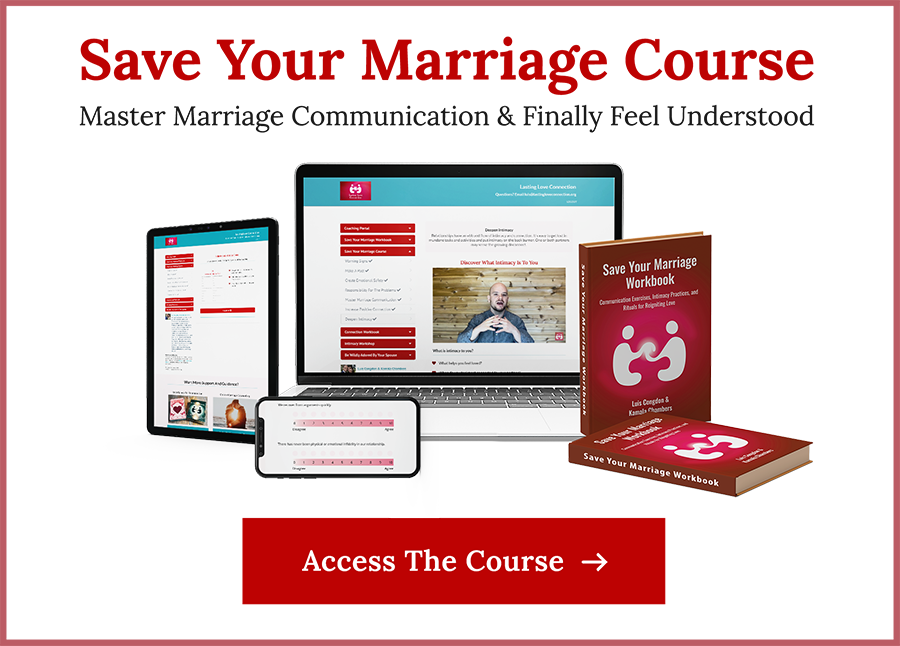Are you looking for healthy relationship conflict resolution strategies?
Maybe your current approach to conflict isn’t working.
You feel stuck in recurring patterns of conflict that take a toll on your relationship.
You don’t know if ending the cycle of fighting and hurting each other is possible.
However, please know that there is hope.
You can break out of old patterns and learn a new way to deal with conflict that doesn’t hurt your relationship.
Dealing with conflict constructively can even strengthen the connection you share.
This article will discuss the common causes of relationship conflict and the importance of healthy conflict resolution.
Additionally, we will explore eight simple relationships conflict resolution strategies that can help you address current challenges and equip you for future conflicts.
Table of Contents
What causes relationship conflict?

Let’s look at some of the most common causes of relationship conflicts and explore some of the most frequent causes of conflict in a relationship.
Communication issues
Misunderstandings and conflict can arise due to defensive listening, unclear expectations, and failure to express your needs and feelings.
Differences in values and beliefs
Conflicts may occur due to differences in religion, politics, parenting styles, or lifestyle choices.
Unmet needs
Conflict can emerge when one or both partners feel their emotional or sexual needs are unfulfilled.
Power struggles

Fighting can occur when there is an imbalance of power or control in the relationship dynamic.
External stressors
At times, conflict may arise due to various circumstances surrounding your relationship.
Financial difficulties, stress from work, issues with family members, or health challenges may overflow into your love life and cause conflict.
Unresolved past issues
Lingering resentment, trust issues, or unresolved traumas can trigger disagreements with your partner.
Different expectations
Conflict can arise when partners have varying expectations about their roles, responsibilities, and the future of their relationship.
Lack of quality time and intimacy
Disagreements may occur when there is a lack of intimacy or partners have stopped spending time together.
If there is emotional distance or disconnection, it can lead to conflict.
Is conflict resolution important for healthy relationships?

Effective conflict resolution is one of the keys to a successful marriage.
Honest communication
When you resolve conflicts in a healthy way, you improve your ability to talk openly about your feelings, concerns, and needs.
Expressing yourself fully is one of the most important aspects of a successful relationship.
However, both partners must feel safe to share without fear of judgment or criticism.
When you establish emotional safety, you trust you’ll fully embrace and accept each other.
By sharing openly, you increase understanding and empathy between you.
Deeper intimacy
When you approach an argument with healthy communication and empathy, it can lead to deeper intimacy in your relationship.
Every time you resolve conflict, you enhance your sense of being a team and build deeper trust.
Even though conflict might be unpleasant, embracing it as a chance for growth makes your relationship stronger.
Prevent resentment
Effective conflict resolution keeps resentment from taking hold in your life.
When you resolve conflict promptly, it prevents hurt feelings and resentment toward your partner from festering and damaging your relationship.
8 tips for resolving conflict in a relationship
Let’s explore effective relationships conflict resolution strategies you can use to work through disagreements with more understanding and less lasting damage to your relationship.
With these tools, you’ll be equipped to better deal with conflict.
1. Tune into your emotions

Being aware of your emotions is crucial when navigating conflict in a relationship.
When you and your partner start arguing, it’s easy to get caught up in the heat of the moment and start spiraling over the small stuff.
This can lead you to react impulsively without considering why you’re angry or upset.
Therefore, it is helpful to pause and take a moment to reflect on your feelings.
Identifying the root cause of your feelings allows you to effectively communicate your needs more clearly.
2. Use assertive communication

After identifying your emotions, the next step is communicating them to your partner.
Research conducted by Dr. John Gottman revealed that how a couple starts a discussion about an issue greatly affects their ability to resolve conflict constructively.
For instance, if you begin by accusing your partner with statements like “I should have known you wouldn’t walk the dog. You’re always so lazy”, they will feel attacked and become defensive.
If you approach the other person calmly and respectfully when expressing concerns, they will likely be more receptive to discussing the issue.
A helpful way to express yourself assertively is using ‘I’ statements.
These statements shift the focus from your partner’s behavior to your own feelings and needs.
For instance, you could tell your partner, “I feel frustrated when the chores we agreed on are not done. Can we talk about this together?”
3. Practice active listening

One of the most crucial conflict management skills is active listening.
In an argument, it’s natural to react and want to defend your position.
However, if you just react to defend yourself, you can’t truly hear what the other person is saying.
Engaging in active listening means shifting focus to understanding your partner’s perspective.
Avoid countering their experiences with your point of view and, instead, genuinely try to grasp where they’re coming from.
While your partner shares, show respect and refrain from interrupting them.
Show attentiveness through sustained eye contact, nodding, and asking follow-up questions.
Ultimately, every person desires to feel seen and heard.
Letting your partner know their feelings make sense and that you are there with them goes a long way in conflict resolution.
4. Avoid unhealthy communication styles
After extensive studies on couples, Dr. John Gottman discovered four communication styles that predict the end of a relationship.
The Four Horsemen
- Criticism: attacking your partner’s character.
- Contempt: when one partner assumes moral superiority over the other partner. Showing contempt can manifest in behavior like name-calling, mocking, eye-rolling, etc.
- Defensiveness: a form of self-protection that involves blaming the other person or making excuses.
- Stonewalling: shutting down during a difficult conversation due to psychological flooding.
The presence of the Four Horsemen while fighting escalates tension and damages your relationship.
Learn more about healthy communication styles in the Save Your Marriage Course.

5. Counteract the Four Horsemen with relationships conflict resolution strategies

Recognizing negative behaviors during conflict helps you replace them with more constructive ones.
Rather than criticism, which can leave your partner feeling attacked, try expressing your concerns calmly using “I” statements.
To combat contempt in your relationship, cultivate more appreciation for your partner.
Instead of dwelling on what your partner is doing wrong, focus on everything you value about them.
Further, acknowledge all that your partner brings to the relationship.
If you want to counteract defensiveness, start taking responsibility for your actions.
By owning up to your mistakes, you demonstrate to your partner that you care about their feelings and concerns.
For further support in breaking negative communication patterns in your relationship, book a complimentary couples consultation with us.
6. Take a break when things get heated

Over the course of your relationship, there will be times when an argument becomes intense.
During a heated conversation, you or your partner can become emotionally flooded.
You may experience a pounding heart, shallow breathing, muscle tension, or intense anger or anxiety.
When you’re outside your window of tolerance, you may lash out and say something you don’t mean or shut down. In this state, it’s impossible to resolve conflict productively.
As soon as you notice signs of emotional flooding, take a 20 break for self-soothing.
During this time, engage in relaxing activities like walking, deep breathing, or reading.
Then, once you and your partner feel calm, you can re-engage in the discussion.
7. Seek a solution that works for both of you

Once you and your partner understand each other’s perspective, you can work together to find a solution.
In some conflicts, the solution is as simple as one person acknowledging they were wrong and apologizing.
Other times, you and your partner may talk through the matter at hand and still not see eye to eye.
In these situations, you can either agree to disagree or try to find a middle ground.
While compromising may not seem ideal, focus on finding a solution that works for both parties.
You may need to brainstorm and come up with the one solution you haven’t thought of yet.
8. Have a third person mediate relationships conflict resolution strategies
Having a third person support you in relationships conflict resolution is incredibly beneficial.
A third person helps to ensure that both parties involved have the opportunity to share their perspective.
When you seek the support of a relationship coach, they will guide you through difficult conversations so you and your partner feel heard and understood.
Develop healthy relationships conflict resolution skills in couples therapy

A relationship coach will help you break old patterns and learn new conflict management skills.
In relationship coaching, not only will you be able to deal with current conflicts, but you’ll also have the tools to help you navigate future conflicts with more ease.
As you utilize your new conflict resolution skills, you’ll deepen your understanding of each other, boost intimacy, and drastically improve your relationship.
Book a complimentary couples consultation to see if working with us would be a good fit.
How do you resolve conflict in a relationship?
Resolving conflicts in a relationship requires a balance of empathy, communication, and healthy compromise. The first step is to create a safe space to share your thoughts and feelings. The key is to give each other space to talk without defensiveness and seek to understand your and your partner’s underlying needs.
Often, conflicts arise because a need is unmet. For example, let’s say you get mad at your partner for playing video games. In this scenario, your need might be for more physical affection, and your partner’s need might be to destress. Understanding the needs creates an opening for understanding and compromise.
Is conflict good or bad for a relationship?
It is a common misconception that conflict always negatively impacts a relationship. However, it is normal for couples to have disagreements and misunderstandings occasionally. In a healthy relationship, the frequency of arguments is not as important as the ability to resolve conflict and repair. When disagreements arise, do you work as a team to find a solution or battle each other to prove a point? Poorly managed or unresolved conflicts negatively affect your relationship, leading to tension, resentment, and emotional distance. Unresolved conflict may result in repetitive patterns that undermine intimacy and trust in your relationship.
What makes conflict worse?
Unhealthy ways to handle conflict include:
Yelling at each other during an argument
Launching personal attacks or insults at the other person
Using unhelpful communication styles like the Four Horsemen (criticism, contempt, defensiveness, and stonewalling)
Giving your partner the silent treatment
Making threats or ultimatums
Any form of abuse
Not talking about issues altogether to avoid conflict






0 Comments